Planning a trip to Munich? This vibrant Bavarian capital is a city where historic charm meets modern allure, offering everything from iconic landmarks and world-class museums to lively beer gardens and a rich culinary scene. Whether you’re a first-time visitor or a seasoned traveler, Munich promises a memorable experience with its unique blend of culture, history, and entertainment. In this guide, we’ll cover everything you need to know about visiting Munich, including top attractions, the best neighborhoods to explore, where to stay, and essential travel tips. Get ready to uncover the best of Munich!
Table of Contents
Planning Your Visit?
When planning your trip to Munich, a bit of preparation goes a long way in making your visit smooth and enjoyable. Here is some essential information to help you get the most out of your time in Bavaria’s beautiful capital.
1. Best Time to Visit Munich
Munich is a year-round destination, but the best time to visit depends on what you want to experience.
- Spring (April to June) offers mild weather and blooming parks, making it perfect for outdoor activities.
- Summer (July to August) brings warm temperatures and lively festivals, but it’s also the busiest and most expensive time.
- Autumn (September to October) is ideal for experiencing Oktoberfest, the world-famous beer festival.
- Winter (November to March) is colder but offers a magical holiday atmosphere, complete with Christmas markets and snow-covered sights.
2. Weather in Munich
Munich has a temperate climate with four distinct seasons. Summers are generally warm, with average highs around 24°C (75°F). Winters can be cold, with temperatures often dipping below freezing, especially in January. Be prepared for rain at any time of the year by packing a waterproof jacket or umbrella.
3. Currency and Payments
Germany uses the Euro (€) as its currency. Credit and debit cards are widely accepted in Munich, but it’s still a good idea to carry some cash for small purchases, especially in local markets or smaller establishments. ATMs (called “Geldautomaten”) are easily found throughout the city.
4. Language
The official language in Munich is German, but many people, especially in the tourism industry, speak English. Learning a few basic German phrases can be helpful and appreciated by locals, but you should be able to get by comfortably speaking English in most places.
5. Getting Around Munich
Munich has an efficient public transportation system that includes the U-Bahn (subway), S-Bahn (suburban trains), trams, and buses. Consider purchasing a Munich CityTour Card or a Munich Card, which provides unlimited travel on public transport and discounts on attractions. Taxis and ride-sharing services like Uber are also available, but public transport is often the fastest and most cost-effective way to get around.
6. Safety Tips
Munich is considered one of the safest cities in Germany, but it’s always wise to take standard precautions. Keep an eye on your belongings in crowded areas, and be aware of your surroundings, especially at night. The emergency number in Germany is 112 for both police and medical services.
7. Essential Packing List
Pack according to the season, but some essentials include comfortable walking shoes, a weather-appropriate jacket, and a power adapter (Germany uses type C and F plugs, with a standard voltage of 230V). Don’t forget a reusable water bottle, as Munich has clean and safe tap water available throughout the city.
8. Travel Insurance
It’s highly recommended to have travel insurance that covers health, accidents, and trip cancellations. Healthcare in Munich is of high quality, but without insurance, costs can be significant.
9. Accessibility
Munich is relatively accessible for travelers with disabilities. Public transportation and many major attractions are wheelchair-friendly. Look for signs marked “barrierefrei” (accessible) or check with individual sites for detailed accessibility information.
10. Tips for Visiting Popular Attractions
Munich’s top attractions, such as Marienplatz, the English Garden, and Nymphenburg Palace, can get crowded, especially in peak season. Arriving early in the morning or late in the afternoon can help you avoid long lines. Consider booking tickets online in advance for popular sites like the Neuschwanstein Castle or the BMW Museum.
11. Local Customs and Etiquette
Germans value punctuality and politeness. A handshake is the standard greeting, and it’s customary to say “Guten Tag” (Good Day) or “Grüß Gott” (a common Bavarian greeting). When visiting churches or religious sites, dress modestly and respect the local customs.
12. Internet and Connectivity and eSim
Free Wi-Fi is available at many cafes, restaurants, and hotels. There are also free public Wi-Fi hotspots throughout the city. If you need constant connectivity, consider buying a local SIM card/ eSim or an international data plan.
Top Attractions in Munich
Munich is a city full of history, culture, and stunning sights. Whether you are a history buff, an art lover, or just someone looking to explore, Munich offers a variety of attractions that cater to all interests. Here are some of the must-visit attractions in Munich:
1. Marienplatz
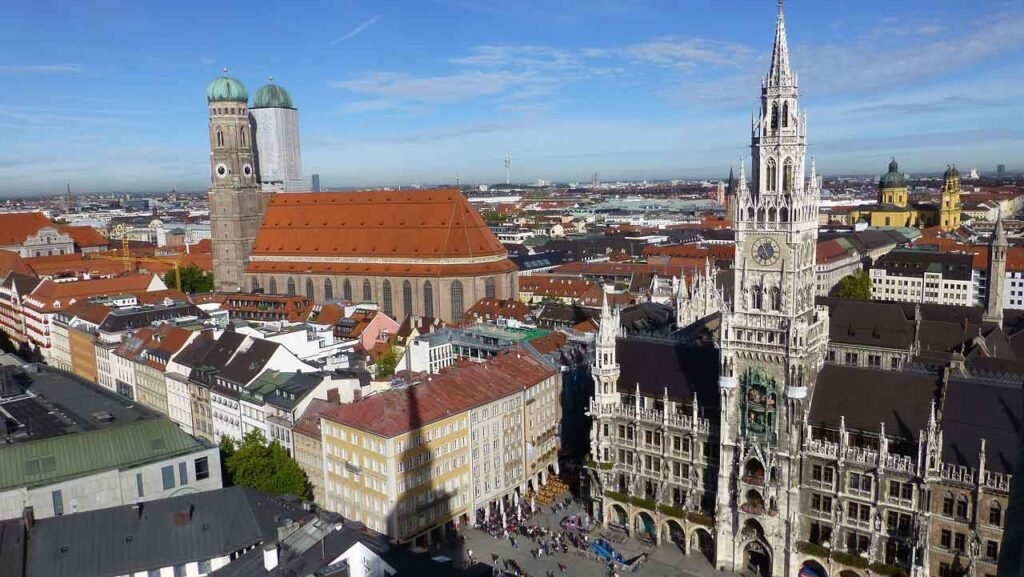
At the heart of Munich lies Marienplatz, the city’s central square and a bustling hub of activity. Here, you can admire the Neues Rathaus (New Town Hall) with its famous Glockenspiel, which performs daily at 11 a.m. and 12 p.m., and 5 p.m. during the summer months. Nearby, you’ll find the Altes Rathaus (Old Town Hall) and the striking Column of St. Mary.
2. English Garden (Englischer Garten)
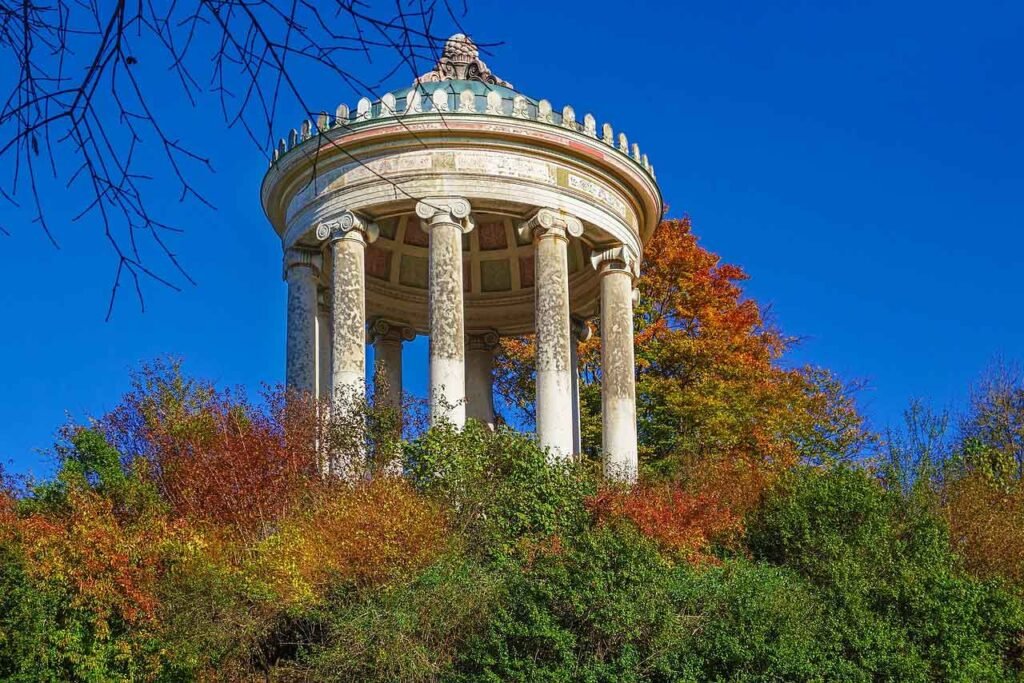
The English Garden is one of the largest urban parks in the world, even bigger than Central Park in New York. Visitors can enjoy a relaxing stroll along the tree-lined paths, rent a paddleboat, or simply relax by the lakes. Don’t miss the Eisbach Wave, a popular spot for local surfers, and the Chinese Tower Beer Garden, one of Munich’s most iconic beer gardens.
3. Nymphenburg Palace (Schloss Nymphenburg)
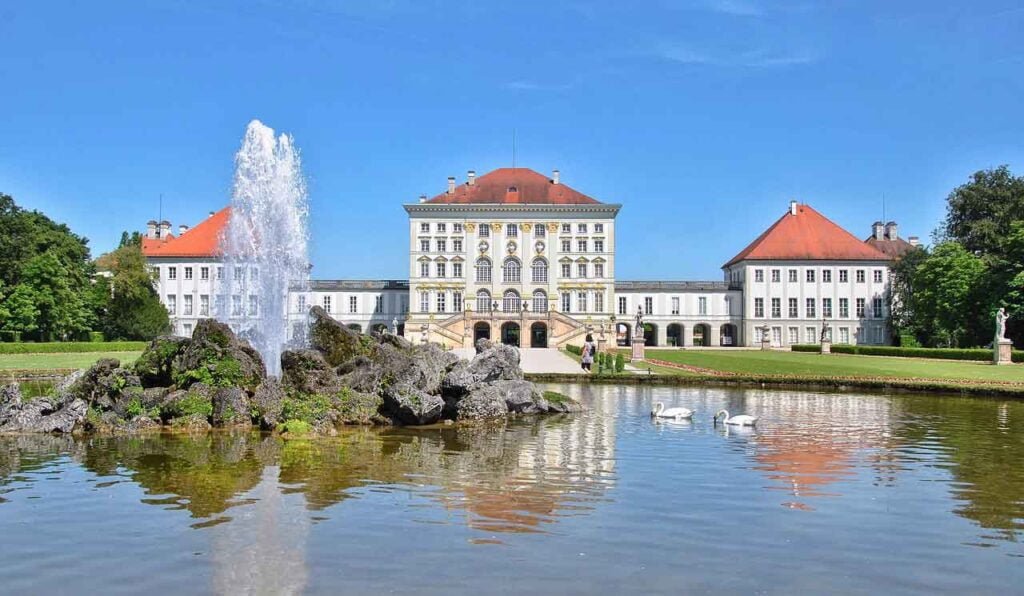
A stunning example of Baroque architecture, Nymphenburg Palace was once the summer residence of Bavarian royalty. The palace’s opulent rooms, extensive art collections, and beautifully landscaped gardens are a must-see. The palace grounds also include the Marstallmuseum and the Museum of Nymphenburg Porcelain.
4. BMW Museum and BMW Welt
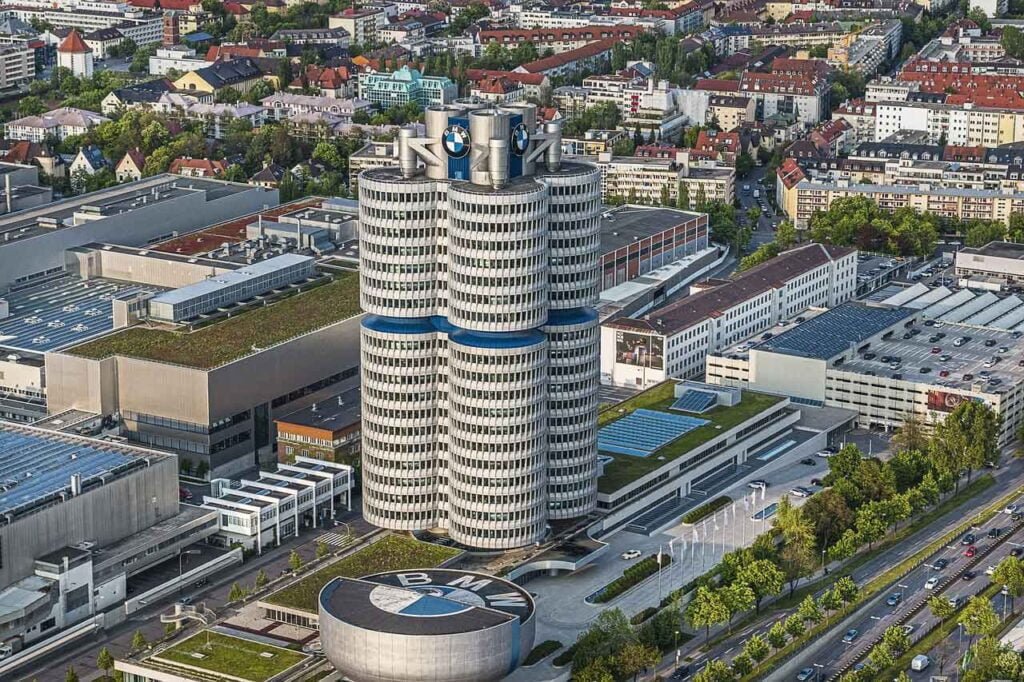
For car enthusiasts, the BMW Museum is an essential stop. Located near the Olympic Park, this museum offers a fascinating look at the history, design, and innovation of the BMW brand. Next door, BMW Welt showcases the company’s latest models and technologies and offers interactive exhibits.
5. Viktualienmarkt
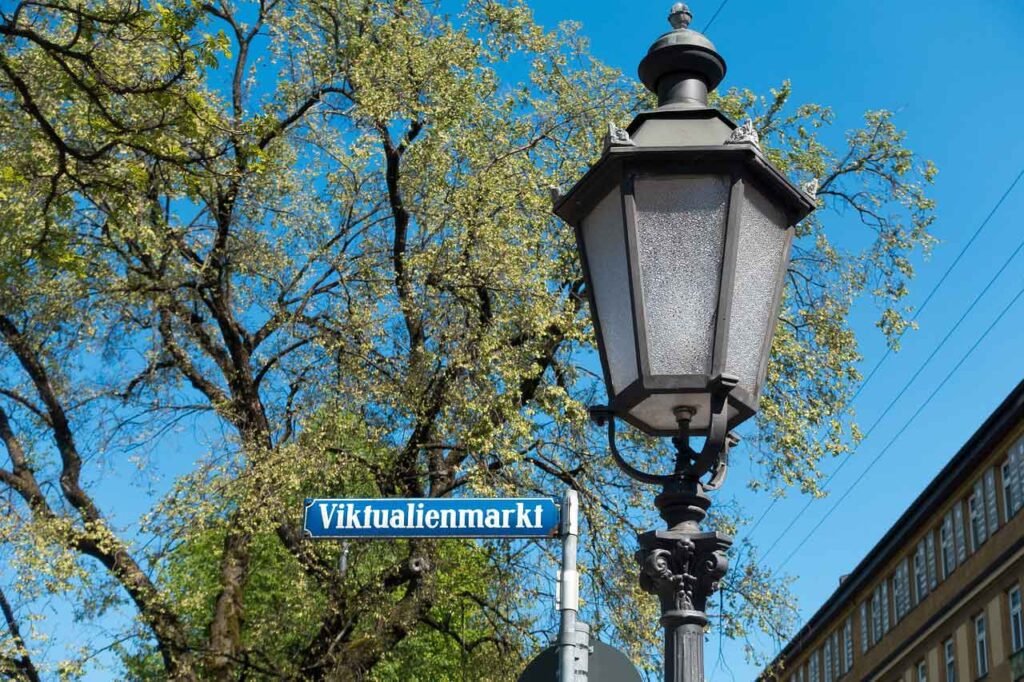
Just a short walk from Marienplatz, the Viktualienmarkt is Munich’s most famous food market. With over 140 stalls selling everything from fresh produce and gourmet cheeses to traditional Bavarian delicacies, it’s a great place to experience local flavors. The market also has a beer garden, perfect for a leisurely afternoon break.
6. Residenz Munich
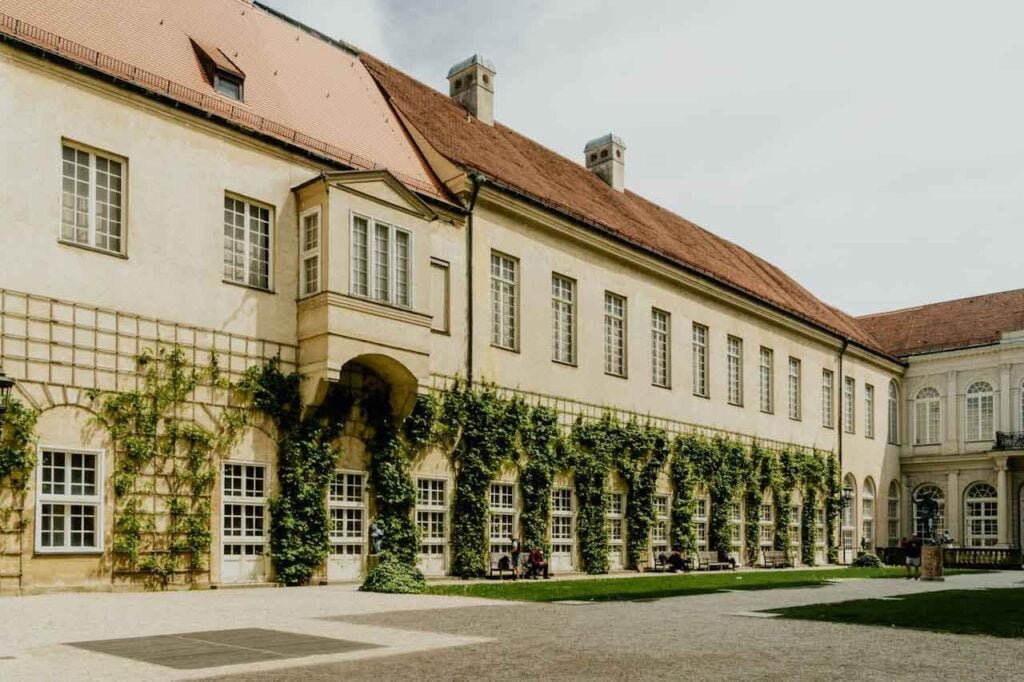
The Munich Residenz is the former royal palace of the Bavarian monarchs and one of the most important cultural sites in Munich. It boasts a collection of over 130 rooms filled with exquisite furniture, tapestries, and artwork. Highlights include the Antiquarium, the largest Renaissance hall north of the Alps, and the Treasury, which displays the crown jewels and other treasures.
7. Deutsches Museum
One of the largest and oldest science and technology museums in the world, the Deutsches Museum is a must-visit for anyone interested in science and innovation. With over 28,000 exhibited objects, ranging from historic aircraft and space probes to interactive exhibits on energy and physics, there’s something to fascinate visitors of all ages.
8. Frauenkirche (Cathedral of Our Lady)
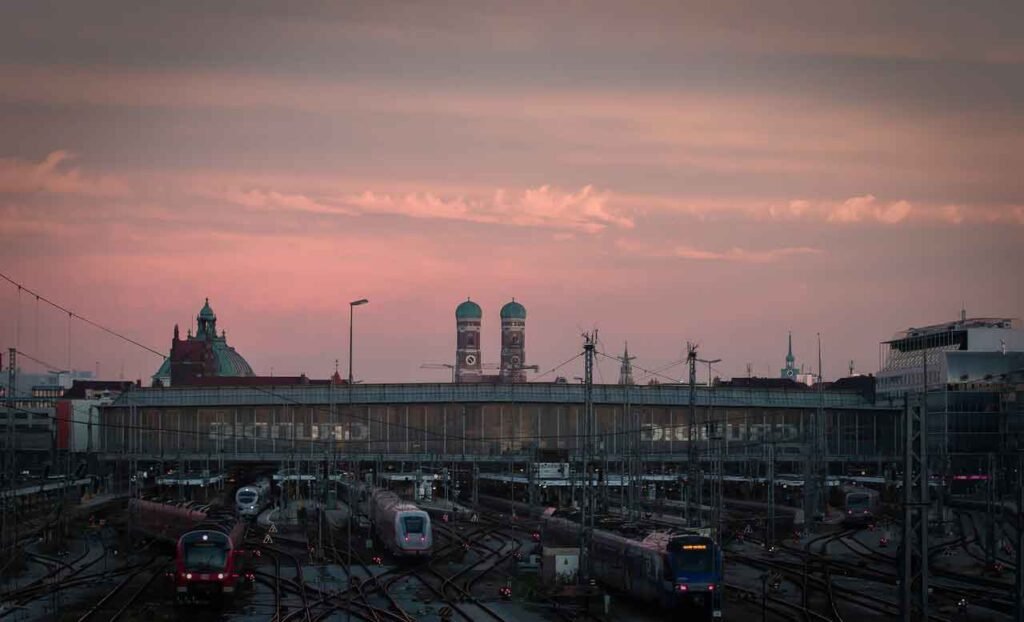
The Frauenkirche, with its distinctive twin towers, is a landmark of Munich’s skyline. This Gothic-style cathedral is known for its stunning architecture and impressive interior, including the famous “Devil’s Footprint” and the tomb of Emperor Ludwig IV. Climb to the top of one of the towers for a panoramic view of the city and the Alps on a clear day.
9. Allianz Arena
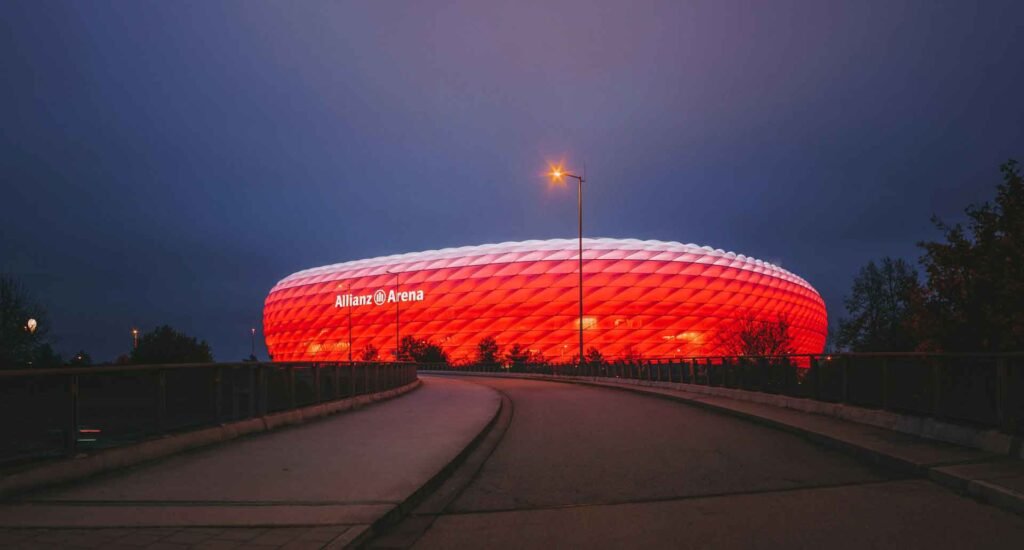
Home to FC Bayern Munich, the Allianz Arena is a must-see for football fans. Known for its unique architecture and color-changing facade, the stadium offers guided tours that take you behind the scenes, including access to the players’ tunnel, locker rooms, and the pitch itself.
10. Asam Church (Asamkirche)
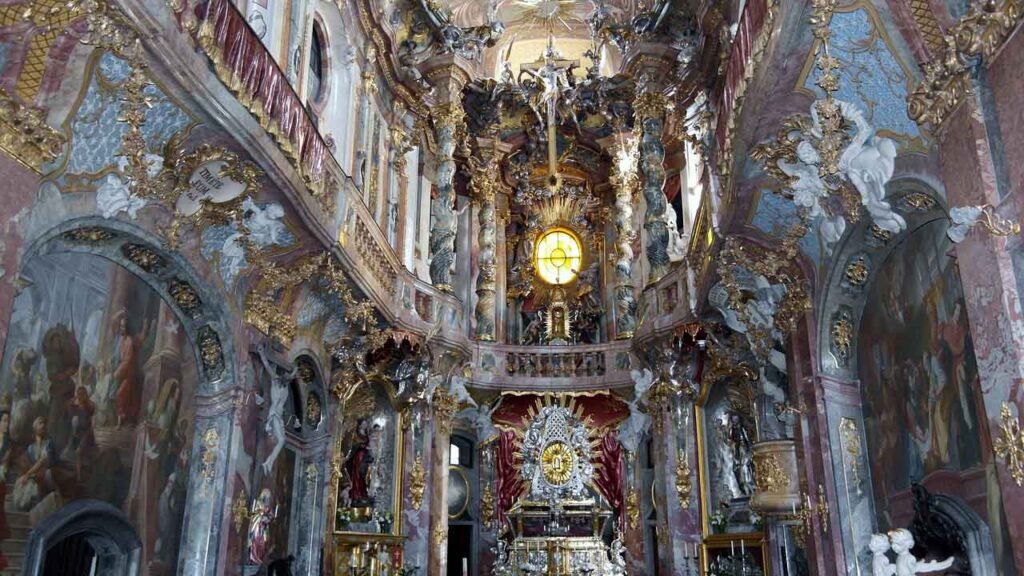
Tucked away in the Sendlingerstrasse, the Asam Church is a stunning example of Bavarian Rococo architecture. Built by the Asam brothers in the 18th century, this small church is lavishly decorated with intricate stuccoes, frescoes, and sculptures, making it a hidden gem in Munich’s city center.
11. Olympic Park (Olympiapark)
Originally built for the 1972 Summer Olympics, Olympic Park is now a popular recreational area. Visitors can enjoy a range of activities, including visiting the Olympic Tower for a breathtaking view of Munich, exploring the Sea Life Munich Aquarium, or enjoying events at the Olympic Stadium.
12. Hofbräuhaus München
No trip to Munich would be complete without a visit to the Hofbräuhaus, one of the most famous beer halls in the world. Founded in 1589, this historic beer hall offers a lively atmosphere with traditional Bavarian music, hearty German cuisine, and, of course, liters of beer.
Munich’s Neighborhoods: Where to Stay and Explore
Munich is a city of diverse neighborhoods, each with its own unique character and charm. Whether you prefer historic streets, lively nightlife, or quiet, residential areas, there’s a neighborhood in Munich to suit your style. Here’s a guide to some of the best neighborhoods in Munich, including where to stay and what to explore.
1. Altstadt-Lehel (Old Town)
Altstadt-Lehel is Munich’s historic heart, where many of the city’s most famous landmarks are located. Staying here puts you within walking distance of major attractions like Marienplatz, Frauenkirche, and the Viktualienmarkt. This area is ideal for first-time visitors who want to be close to the action, with plenty of hotels, shops, and restaurants.
- Explore: Visit the New Town Hall and watch the Glockenspiel performance, stroll through the narrow streets filled with historic buildings, and enjoy shopping at upscale boutiques along Maximilianstrasse.
- Stay: Altstadt-Lehel offers a range of accommodation options, from luxury hotels like the Bayerischer Hof to charming boutique hotels.
2. Maxvorstadt
Known as Munich’s cultural quarter, Maxvorstadt is home to many of the city’s museums, art galleries, and universities. This vibrant neighborhood has a youthful atmosphere, thanks to its large student population, and is an excellent choice for art lovers and history enthusiasts.
- Explore: Spend a day at the Kunstareal, Munich’s art district, which includes the Pinakothek museums, the Lenbachhaus, and the Glyptothek. Wander through the Englischer Garten or relax at a café along Turkenstrasse.
- Stay: Maxvorstadt offers a mix of mid-range hotels and budget accommodations, making it perfect for those looking to experience Munich’s cultural side without staying in the busy city center.
3. Schwabing
Schwabing is Munich’s bohemian quarter, known for its lively nightlife, art scene, and trendy shops. This area has a youthful, creative vibe and is filled with cozy cafes, restaurants, and bars. Schwabing is perfect for those who want to experience a more relaxed, local side of Munich.
- Explore: Walk along Leopoldstrasse and Hohenzollernstrasse to discover local boutiques and eateries. Visit the northern part of the English Garden and stop by the Monopteros for scenic views.
- Stay: Schwabing offers a variety of accommodation, from boutique hotels to comfortable guesthouses, ideal for travelers who enjoy a mix of cultural experiences and vibrant nightlife.
4. Glockenbachviertel
One of Munich’s trendiest neighborhoods, Glockenbachviertel is known for its LGBTQ-friendly environment, hipster vibe, and eclectic mix of bars, restaurants, and shops. This area has a unique blend of old and new, with historic buildings and modern amenities.
- Explore: Stroll along Gärtnerplatz and Reichenbachstrasse for stylish boutiques and quirky cafes. Enjoy the nightlife at popular bars and clubs or relax by the Isar River.
- Stay: Accommodation here ranges from trendy hotels to charming bed and breakfasts, catering to a diverse range of travelers.
5. Haidhausen
Haidhausen, located on the east bank of the Isar River, is a quiet, residential neighborhood with a village-like feel. It’s known for its beautiful 19th-century architecture, cozy cafes, and local markets. Haidhausen is a great choice for families or travelers seeking a more laid-back experience.
- Explore: Visit the Gasteig cultural center, stroll through the Weißenburger Platz, or enjoy a beer at the historic Hofbräukeller beer garden. Don’t miss the weekly market at Wiener Platz for fresh produce and local delicacies.
- Stay: Haidhausen has a range of accommodations, including boutique hotels, family-run guesthouses, and vacation rentals.
6. Ludwigsvorstadt-Isarvorstadt
Ludwigsvorstadt-Isarvorstadt is a diverse area that combines historic sites with modern amenities. It is best known for hosting Oktoberfest at the Theresienwiese fairgrounds. This neighborhood is vibrant and multicultural, offering a mix of cuisines and experiences.
- Explore: Visit the Deutsches Museum, Europe’s largest museum of science and technology, or wander through the colorful streets of the Gärtnerplatz district. The area is also great for enjoying international cuisine, especially around Goetheplatz and Schwanthalerhöhe.
- Stay: This neighborhood offers a range of accommodations, from budget-friendly hostels to mid-range hotels, making it an ideal choice for travelers attending Oktoberfest or those who want a central yet varied location.
7. Neuhausen-Nymphenburg
Neuhausen-Nymphenburg is a peaceful, upscale residential neighborhood that offers a glimpse of local life in Munich. It is most famous for the beautiful Nymphenburg Palace and its vast gardens.
- Explore: Tour the Nymphenburg Palace and enjoy a leisurely stroll through the Botanical Garden or visit the Museum of Man and Nature. The neighborhood also has plenty of charming cafes and local eateries.
- Stay: Ideal for those looking for a quiet retreat away from the bustling city center, Neuhausen-Nymphenburg has a selection of comfortable hotels and vacation rentals.
8. Bogenhausen
Bogenhausen is one of Munich’s most affluent neighborhoods, located along the eastern bank of the Isar River. It is known for its beautiful villas, parks, and cultural sites.
- Explore: Visit the Villa Stuck Museum, dedicated to the works of the painter Franz von Stuck, or enjoy a peaceful walk in the Denninger Anger Park. The Herz-Jesu Church is also worth a visit for its stunning modern architecture.
- Stay: Bogenhausen offers luxury hotels and elegant accommodations, perfect for those seeking a more refined stay.
Each neighborhood in Munich has its own unique appeal, from the historic streets of Altstadt to the trendy vibe of Glockenbachviertel. Choose a neighborhood that matches your interests and style, and you’ll find plenty of places to stay and explore during your visit to Munich.
Accommodation Options in Munich
Finding the perfect place to stay in Munich is easy, thanks to the city’s wide range of accommodation options. Whether you’re looking for luxury hotels, budget-friendly hostels, cozy guesthouses, or unique boutique stays, Munich has something for every type of traveler. Here’s a guide to the best accommodation options in Munich to suit your needs.
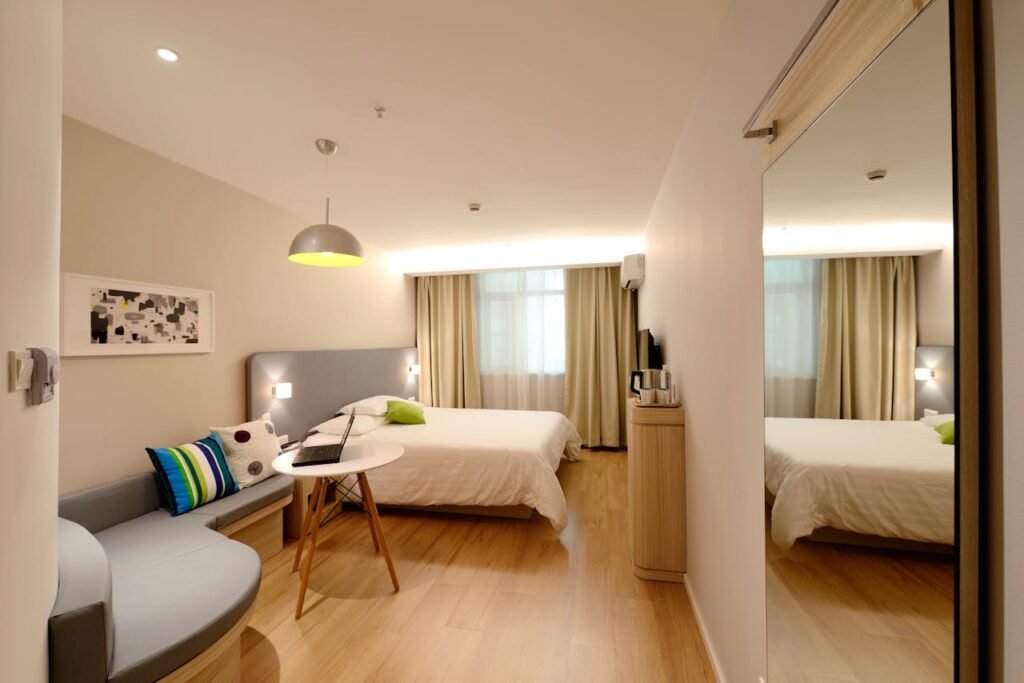
1. Luxury Hotels in Munich
For those seeking a high-end experience, Munich offers several luxury hotels that provide exceptional comfort and service.
- Hotel Bayerischer Hof: Located in the heart of Munich near Marienplatz, this five-star hotel is known for its elegant rooms, rooftop terrace, and Michelin-starred dining options.
- Mandarin Oriental Munich: Situated in a quiet street in Altstadt, this hotel combines historical charm with modern luxury, offering spacious suites, a rooftop pool, and stunning views over the city.
- The Charles Hotel: Overlooking the Old Botanical Garden, The Charles Hotel is a top choice for travelers looking for contemporary luxury, with a spa, indoor pool, and gourmet restaurant.
2. Mid-Range Hotels in Munich
Munich has plenty of mid-range hotels that offer comfort and convenience without breaking the bank.
- Hotel Torbräu: A family-run hotel in a historic building near Isartor, it’s perfect for travelers who want to be close to major attractions like Marienplatz and the Viktualienmarkt.
- Eurostars Grand Central: Located near Munich Central Station, this hotel offers modern amenities, a spa, and easy access to public transportation, making it ideal for both leisure and business travelers.
- King’s Hotel First Class: This charming boutique hotel near the central train station features Victorian-style décor, cozy rooms, and a welcoming atmosphere.
3. Budget-Friendly Hostels in Munich
For travelers on a budget, Munich offers several hostels that provide affordable accommodation with a friendly, social atmosphere.
- Wombat’s City Hostel: Located near the central train station, this hostel is popular with backpackers and budget travelers for its clean rooms, lively bar, and daily walking tours.
- Euro Youth Hotel: A few steps from Munich’s Hauptbahnhof (central train station), this hostel offers both dorms and private rooms, a bar, and a relaxed vibe.
- Meininger Hotel Munich City Center: This budget hotel/hostel hybrid offers a range of room types, from dorm beds to private family rooms, and is conveniently located near Theresienwiese, home of Oktoberfest.
4. Boutique Hotels in Munich
For those who prefer unique and personalized stays, Munich has a selection of boutique hotels that offer charm and character.
- Hotel La Maison: Located in Schwabing, this boutique hotel features contemporary design, a relaxed atmosphere, and is close to many cafes, shops, and the English Garden.
- Cortiina Hotel: Situated in the Altstadt, Cortiina offers stylish rooms, an excellent breakfast, and a central location close to Marienplatz and other major attractions.
- Flushing Meadows Hotel & Bar: A hip boutique hotel in the Glockenbachviertel neighborhood, known for its individually designed rooms and a rooftop bar with panoramic views.
5. Family-Friendly Accommodations in Munich
Munich is a great city for families, and there are plenty of accommodations catering to those traveling with children.
- Novotel München City: This modern hotel near the Deutsches Museum offers spacious family rooms, an indoor pool, and a kid-friendly atmosphere.
- Hotel Uhland: A small, family-run hotel located near Theresienwiese, with spacious rooms, a quiet garden, and free breakfast, perfect for families.
- Citadines Arnulfpark Munich: An aparthotel offering studios and apartments with kitchenettes, ideal for families who need a bit more space and flexibility.
6. Unique Stays in Munich
For travelers looking for something different, Munich has some unique accommodation options that offer a memorable experience.
- Hotel Blauer Bock: Located in a historic building near Viktualienmarkt, this hotel combines history with modern comfort and offers a cozy courtyard and restaurant.
- Leonardo Royal Hotel Munich: Set in a unique modern building, this hotel is known for its quirky design, artistic decor, and a large garden terrace.
- The Lovelace – A Hotel Happening: A temporary hotel concept in a former bank building, offering pop-up events, art installations, and a mix of modern and historic elements.
7. Vacation Rentals in Munich
For those who prefer the comfort of a home-like environment, Munich has plenty of vacation rentals ranging from apartments to entire houses.
- Airbnb: Offers a variety of rentals across Munich, from central apartments in Altstadt to more spacious homes in quieter neighborhoods like Haidhausen or Neuhausen-Nymphenburg.
- Local Agencies: Websites like Fewo-Direkt (Germany’s version of VRBO) provide listings for short-term apartment rentals in various parts of Munich.
8. Business Hotels in Munich
If you are traveling for work, Munich offers several hotels with business-friendly amenities like conference rooms, fast Wi-Fi, and easy access to transportation.
- Marriott Munich City West: Located in the business district near Westend, this hotel offers modern conference facilities and is well-connected to public transport.
- Hilton Munich Park: Close to the English Garden, this hotel provides excellent meeting spaces, a fitness center, and panoramic views of the city.
- Holiday Inn Munich City Centre: Conveniently located near Rosenheimer Platz, this hotel offers meeting rooms, a business center, and quick access to public transport.
Frequently Asked Questions About Munich
Planning a visit to Munich often comes with a few questions, especially if it’s your first time in the city. Here are answers to some of the most frequently asked questions about Munich to help you make the most of your trip.
1. What is the Best Time to Visit Munich?
The best time to visit Munich is during the spring (April to June) or fall (September to October). The weather is pleasant, and you can enjoy outdoor activities like visiting beer gardens or exploring the English Garden. If you want to experience the world-famous Oktoberfest, plan your visit for late September to the first weekend of October.
2. How Can I Get Around Munich?
Munich has an excellent public transportation system, including the U-Bahn (subway), S-Bahn (commuter trains), trams, and buses. A single ticket or a day pass can be used on all modes of transport. You can also explore the city by bike, as Munich is very bike-friendly. Taxis and ride-sharing services are available but can be more expensive.
3. What Are the Top Attractions in Munich?
Some of the top attractions in Munich include Marienplatz, the English Garden, Nymphenburg Palace, the BMW Museum, Viktualienmarkt, and the Deutsches Museum. Don’t miss the historic Munich Residenz, the iconic Frauenkirche, and the bustling beer halls like Hofbräuhaus.
4. Is Munich an Expensive City to Visit?
Munich can be considered moderately expensive compared to other European cities, especially when it comes to accommodation and dining in tourist areas. However, there are plenty of budget-friendly options, such as affordable hotels, hostels, and street food. Using public transport and enjoying free attractions, like the English Garden or Marienplatz, can help keep costs down.
5. Do People in Munich Speak English?
Yes, many people in Munich speak English, especially in tourist areas, hotels, and restaurants. However, it’s always appreciated if you learn a few basic German phrases like “Guten Tag” (Good day) and “Danke” (Thank you).
6. What Should I Eat in Munich?
Munich is known for its traditional Bavarian cuisine. Must-try dishes include Weißwurst (white sausage), Brezn (pretzels), Schweinshaxe (pork knuckle), and Apfelstrudel (apple strudel). Don’t forget to enjoy a beer in one of Munich’s famous beer gardens or beer halls.
7. How Safe is Munich for Tourists?
Munich is considered one of the safest cities in Germany for tourists. However, like any major city, it’s important to stay vigilant and take normal precautions, such as avoiding poorly lit areas at night and keeping an eye on your belongings, especially in crowded places.
8. Where Can I Stay in Munich?
Munich offers a wide range of accommodation options, from luxury hotels in the city center to budget hostels, boutique hotels, and vacation rentals in various neighborhoods. Popular areas to stay include Altstadt-Lehel (Old Town), Schwabing, Maxvorstadt, and Glockenbachviertel.
9. What Are the Best Day Trips from Munich?
Munich is an excellent base for day trips to nearby attractions. Popular destinations include Neuschwanstein Castle, Salzburg (Austria), Dachau Concentration Camp Memorial Site, and the Bavarian Alps. You can easily reach these places by train or car.
10. How Can I Experience Oktoberfest in Munich?
To experience Oktoberfest in Munich, plan your visit for late September to early October. The festival takes place at the Theresienwiese fairgrounds, where you can enjoy traditional Bavarian beer, food, music, and rides. It’s best to book your accommodation well in advance, as hotels fill up quickly during this period.
11. What Currency is Used in Munich?
Munich, like the rest of Germany, uses the Euro (€). Credit cards are widely accepted, but it’s a good idea to have some cash on hand for smaller shops, markets, or if you plan to visit beer gardens.
12. How Can I Get to Munich from the Airport?
Munich Airport (MUC) is about 40 kilometers (25 miles) from the city center. The easiest way to reach the city is by taking the S-Bahn (S1 or S8 lines), which connects the airport to major stations like Hauptbahnhof (Central Station). Taxis and airport shuttles are also available, but they are more expensive.
13. Is Munich a Family-Friendly Destination?
Absolutely! Munich offers many family-friendly attractions, including the Deutsches Museum for kids, the Hellabrunn Zoo, and plenty of parks and outdoor activities like biking and boat rides in the English Garden. The city is safe, clean, and has good public facilities, making it an ideal destination for families.
14. What Should I Pack for a Trip to Munich?
What you pack depends on the season. In summer, bring lightweight clothing, a hat, sunscreen, and comfortable walking shoes. In winter, pack warm clothing, including a coat, gloves, and waterproof boots, as temperatures can drop, and snow is common. Don’t forget an umbrella or rain jacket, as Munich weather can be unpredictable.
Conclusion
Munich is a city that effortlessly blends tradition and modernity, offering visitors a unique experience filled with rich history, vibrant culture, and welcoming charm. From exploring its top attractions, like Marienplatz and Nymphenburg Palace, to discovering the diverse neighborhoods such as Altstadt-Lehel and Schwabing, there’s no shortage of things to see and do. With a wide range of accommodation options, from luxury hotels to budget-friendly hostels, Munich caters to all types of travelers, ensuring a comfortable and memorable stay.
Whether you’re planning a visit during the festive Oktoberfest, looking to enjoy the city’s culinary delights, or simply wanting to explore its beautiful parks and museums, Munich has something for everyone. As you prepare for your trip, make sure to consider the practical tips and answers to frequently asked questions provided in this guide to make the most of your time in this fascinating city.
No matter what brings you to Munich, you’ll find a city that is as warm and welcoming as it is diverse and dynamic. Get ready to immerse yourself in everything Munich has to offer — from its historic landmarks and vibrant neighborhoods to its delicious cuisine and lively beer gardens. Your adventure in Munich awaits!










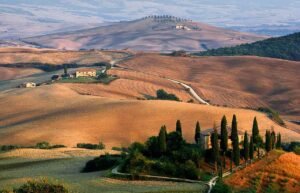

Pingback: Oktoberfest 2024: A Beginner's Guide to Munich's Legendary Beer Festival - Tourist Hike
Pingback: The Ultimate Day Trip to the City of Cologne: Must-See Attractions and Tips - Tourist Hike
Pingback: Top 18 Best Bars in Munich for Every Type of Night Out My Top Picks - Tourist Hike
Pingback: Best Breakfast in Munich: 10 Must-Try Cafés and Restaurants for Every Taste - Tourist Hike
Pingback: Berlin, Germany: A Complete Travel and City Guide for First-Time Visitors - Tourist Hike